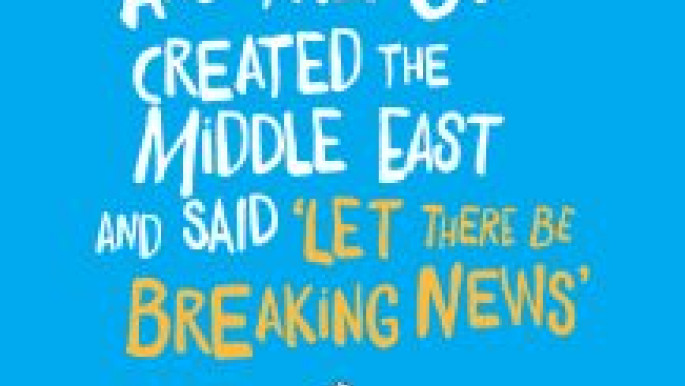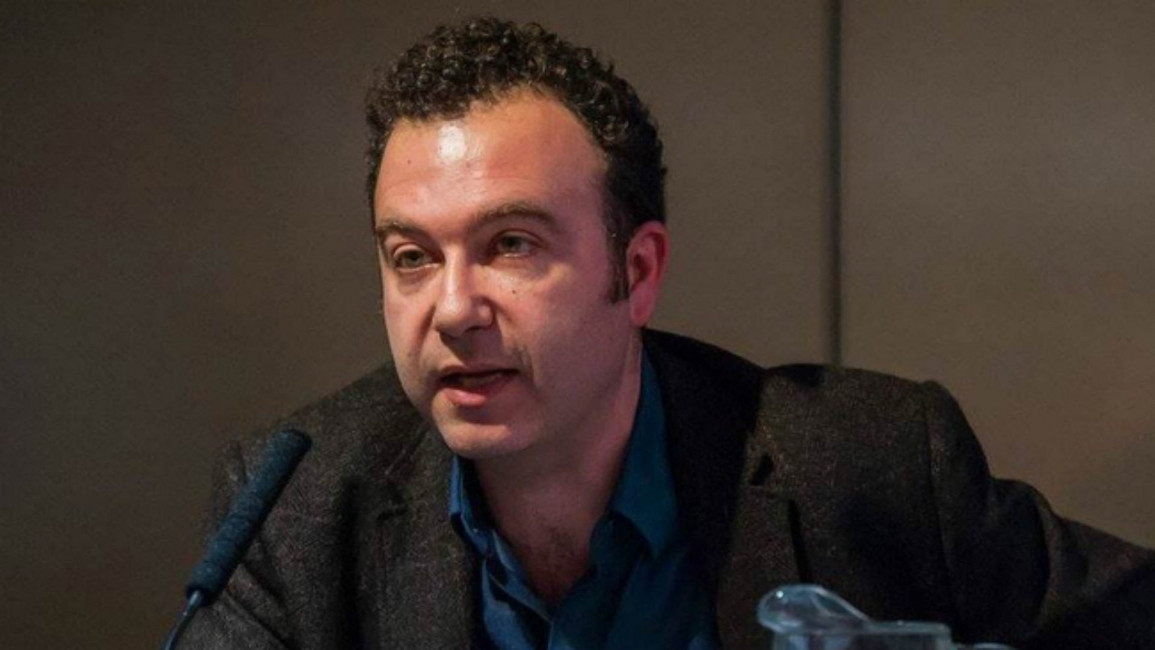
Karl ReMarks' satire migrates from twitter to print
But Karl Sharro - successful architect by day, and satirist during his lunch break - better known as @KarlreMarks to his 100,000 plus Twitter followers, is no ordinary online personality.
Karl likes to distil western perceptions of the Middle East and the complexities of the region in a handful of funny tweets and drawings.
The success of his online persona has led him to launch a book of his tweets, "And Then God Created the Middle East and Said 'Let There Be Breaking News'", published by Saqi Books.
I asked Karl about his migration from Twitter to the world of book publishing, at a time when many seem to be doing the opposite.
"I think the nature of the medium (blogging and Twitter) is made up of these fragments, and there isn't a strong intellectual narrative through it. We are always reacting to the news, so it's always bound (to it).
"I wanted to think about how to take - well I wouldn't call it body of work; that's too glorified - but what I have done on Twitter that does have an internal narrative to it and can sustain itself, and turn itself into a more durable a format.
"I had some success with a standup show I did in Edinburgh where I was able to explore the internal narrative behind what I tweet about, and it made me think if it is possible to sustain that in a book format."
Though charming and friendly with a self-deprecating sense of humour, Karl is a serious person. He started his online life as a blogger, and wrote both satirical and serious articles analysing the Arab Spring.
But as the format of blogging began to die out, Karl moved to Twitter where his satirical persona took off. His new book is a collection of his most popular Tweets and sketches. His Tweets are already used in university lectures and his book could even serve as an accompaniment for students.
 |
|
"Everyone always says people don't read anymore, and I have this joke that I can no longer read the books I used to, unless someone divides it up into 280 characters. But it is a real issue.
"In 2015 all of these (western) experts were trying to explain the phenomenon of IS with one single cause. So you would get people writing climate change caused IS or poverty caused IS, but it could not be two things being the cause of IS, it was almost like a competition. So, I did this joke where I would explain ISIS in a single sentence, but the sentence would run on-and-on and would have things like after the failure of postcolonial elites, the Iraq invasion etc."
Our discussion moves from how the West sees the region to how obsessed some countries in the Middle East are with their image in the West. I joke that going between Lebanon and Syria before the Arab Spring, the Lebanese were always worried about how they are seen by the outside world, whereas Syrians barely seem to notice the outside world. Karl laughs and nods.
"I grew up between Lebanon, Syria and Iraq; I use to spend long periods of time in these places. I use to go to Syria every weekend and Iraq quite frequently, because my mother is Iraqi. I'm intimately familiar with what happens in these societies.
"What happened in Syria was an abrupt entry onto the global scene (with the 2011 Revolution) which I think was ultimately very problematic. I think the dialogue between the Syrian opposition and outside powers in terms of appealing for sympathy and support happened on very unequal terms.
 |
'I wanted to think about how to take what I have done on Twitter and turn itself into a more durable a format' |  |
"They privileged the image (of suffering) and trying to draw people in, because I think Syrians felt quite helpless, I don't think you can blame the medium rather than the context in which this happens, but they thought the more images of horror they distributed the faster help would come.
"This was obviously not the case. I think it had a negative impact on the Syrian revolution and later civil war, again I don't blame the medium, but as your observation suggests, Syrians went from being totally cut off from it (the wider world) to total exposure to it, and didn't know how to form a dialogue with it."
Reflecting upon the relationship between young people's embrace of social media in the Arab World and their governments; just as eager to imprison them for it, Sharro says:
Twitter Post
|
"To my mind its two heads of the same coin, I think both the authorities and the dissenting youth have too much faith in the power of the medium and social media itself.
"In the beginning I was writing quite serious analysis from March to June 2011, saying part of the problem is that there is too much emphasis on drawing in external support. That killed of the autonomy of movements in Arab countries that experienced uprisings. Ultimately it was quite damaging to the development of those political movements.
"Unfortunately what I think we are seeing today is the persistence of that and very interestingly the regimes themselves are fixated on this kind of power."
While Karl clearly has a lot to offer beyond satire, it remains to be seen how successful his attempts to create a thought-provoking narrative through books will be. A bigger story can be told and he seems eager to tell it, but the question of whether retweets will translate into book sales is still on the table.
Usman Butt is a multimedia television researcher, filmmaker and writer based in London. Usman read International Relations and Arabic Language at the University of Westminster and completed a Master of Arts in Palestine Studies at the University of Exeter.
Follow him on Twitter: @TheUsmanButt
Opinions expressed in this article remain those of the author and do not necessarily represent those of The New Arab, its editorial board or staff.




